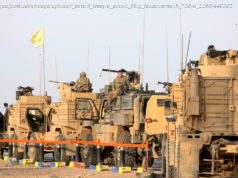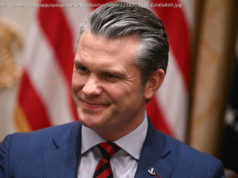But there’s reason to be skeptical.
North Korea just reopened a communications channel with South Korea after nearly two years of silence, a move that could lower the chances of an accidental war between the two longtime foes.
North Korean military officials spoke twice with their southern counterparts on January 3. They first chatted at 3:30 pm local time and “checked technical issues of the communication line” for about 20 minutes, according to South Korea’s Ministry of Unification. North Korea then called South Korea around 6:07 pm simply to say “let’s call it a day today,” the ministry said.
It may not seem like much, but those brief conversations over the phone line have the potential to calm the growing tensions between the US and South Korea on one side and North Korea on the other — tensions that could lead to a catastrophic war .
President Donald Trump took credit for the talks on Wednesday, tweeting, “does anybody really believe that talks and dialogue would be going on between North and South Korea right now if I wasn’t firm, strong and willing to commit our total ‘might against the North,” adding that “talks are a good thing!” Secretary of Defense Jim Mattis told reporters on Wednesday that “we don’t know if [the offer of talks are] a genuine olive branch or not.”
Many experts believe North Korea’s decision to start talking again isn’t solely a gesture of goodwill. Instead, they say the North likely is using the once-defunct communications channel for more concrete reasons.
First, Kim Jong Un wants his athletes to participate in the upcoming Winter Olympics in South Korea. Second, he wants to see what South Korea might agree to, like canceling all military drills with the US. And finally, he may hope that speaking directly to South Korea will make Seoul decide America isn’t a necessary participant in future peace talks. That could potentially drive a diplomatic wedge between Seoul and Washington.
“The fact that North Korea wants to talk to South Korea makes me cautiously optimistic, but I don’t have high expectations,” Jung Pak, a former US intelligence official who is now a Koreas expert at the Brookings Institution, told me in an interview. “We need to be careful about not blowing this out of proportion.”
The communications channel is actually a phone line that lower-level military officials at the border can use to talk with each other in case of escalating tensions. A chat between the North and South can help assure there are no miscues between the two sides that could potentially spiral into an open war.
For example, if a North Korean soldier defects into the South — as happened last November — the phone line could help both sides understand what took place. After all, North Korean soldiers shot at the defector around 40 times, and one even stepped over the border. It’s possible one South Korean soldier might’ve felt the shots were part of an attack and therefore decided to fire back. Having the phone line would let both sides know immediately what was happening.
But Pyongyang decided to shutter its end of the line in February 2016 because South Korea closed a joint industrial complex over the North’s missile tests. That business park served as a way to for the two countries to establish closer ties as North Koreans and South Koreans worked closely together. After the closure, South Korea continued to ring its northern neighbors at 9 am and 4 pm every weekday — but North Korean officials didn’t answer.
The line’s reopening comes after Kim said during a New Year’s Day speech that he wanted North Korean athletes to participate in the 2018 Winter Olympics in Pyeongchang, South Korea.
South Korean President Moon Jae-in, a liberal who has long advocated for an ongoing dialogue with North Korea, quickly reacted to Kim’s speech by saying it was “a response to our proposal to turn the Pyeongchang Olympic Games into an epoch-making opportunity to improve inter-Korean relations and establish peace.”
Just a day later, South Korean Unification Minister Cho Myoung-gyon said both countries should meet at the border village of Panmunjom on January 9 to discuss the Olympics and their relationship. North Korea has yet to accept the offer.
So there is a chance that these calls could improve ties between the North and South, potentially lower the chance of a still-unlikely US-North Korea war, and pave the way for North Korean athletes to attend the Olympics. And while that’s already ambitious, it’s probably not all Kim is after.
Experts noted that North Korea likely isn’t calling just to avoid war or to ensure North Korean athletes can participate in the Olympic Games.
“We need to be very cautious about our expectations given North Korea’s long history of effectively using these talks to drive a wedge between South Korea and its partners, and to push for concessions Seoul couldn’t possibly accept,” Mintaro Oba, a former Obama State Department official who worked on North Korean affairs, said in an interview.
That’s potentially Kim’s plan now. “Kim’s ruse is simple: He will demand some sort of economic assistance, sanctions relief, or a straight bribe” in exchange for not disrupting the Olympics, Harry Kazianis, an Asia security expert at the Center for the National Interest, told me.
On top of that, Kim could leverage the Olympics to convince the US and South Korea to stop their joint military drills. There is definitely an opportunity for Kim to exploit. On December 19,2017, Moon requested that the US and South Korea halt all military exercises until after the Olympics. And just last Thursday, Trump accepted that offer. It’s unclear if North Korea’s recent calls had anything to do with Trump’s decision, but experts note that Kim might decide that future calls could lead to other drill cancellations.
And if that happens, it could potentially help accomplish one of North Korea’s top goals: driving a diplomatic wedge between South Korea and America. There is a small chance for Kim to achieve that too.
“President Moon’s administration has talked of ‘balanced diplomacy’ to hedge against being overly dependent on the United States,” retired Marine Lt. Gen. Chip Gregson, the Pentagon’s top Asia official from 2009 to 2011, told me in an interview.






